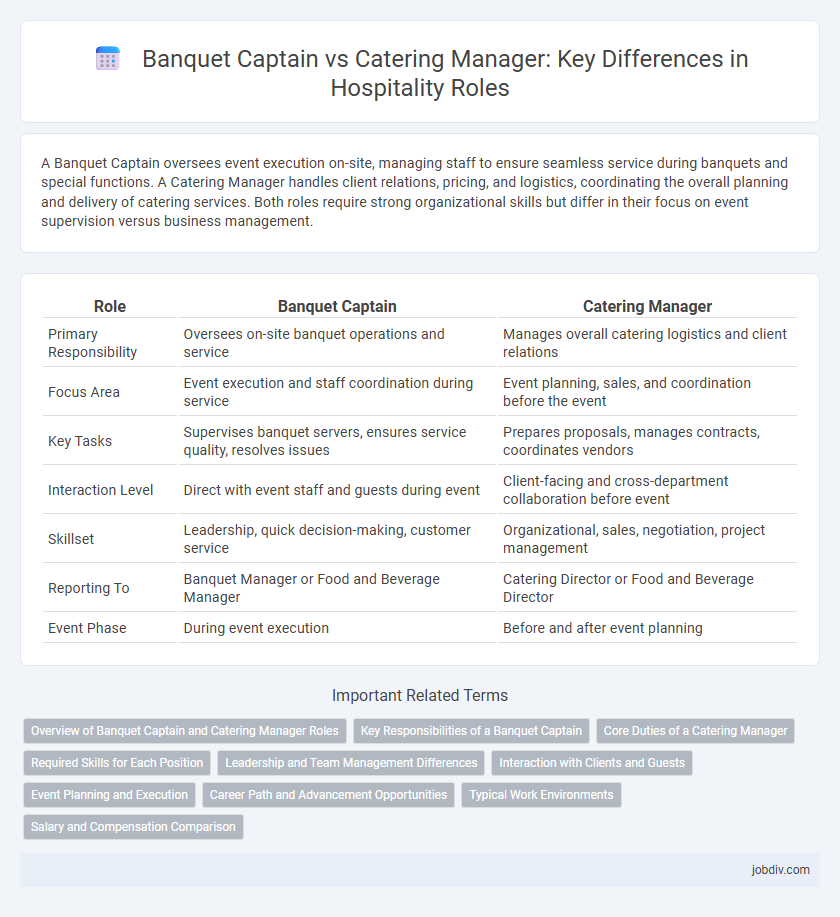A Banquet Captain oversees event execution on-site, managing staff to ensure seamless service during banquets and special functions. A Catering Manager handles client relations, pricing, and logistics, coordinating the overall planning and delivery of catering services. Both roles require strong organizational skills but differ in their focus on event supervision versus business management.
Table of Comparison
| Role | Banquet Captain | Catering Manager |
|---|---|---|
| Primary Responsibility | Oversees on-site banquet operations and service | Manages overall catering logistics and client relations |
| Focus Area | Event execution and staff coordination during service | Event planning, sales, and coordination before the event |
| Key Tasks | Supervises banquet servers, ensures service quality, resolves issues | Prepares proposals, manages contracts, coordinates vendors |
| Interaction Level | Direct with event staff and guests during event | Client-facing and cross-department collaboration before event |
| Skillset | Leadership, quick decision-making, customer service | Organizational, sales, negotiation, project management |
| Reporting To | Banquet Manager or Food and Beverage Manager | Catering Director or Food and Beverage Director |
| Event Phase | During event execution | Before and after event planning |
Overview of Banquet Captain and Catering Manager Roles
The Banquet Captain oversees on-site event execution, managing staff, ensuring service standards, and coordinating banquet logistics during functions. The Catering Manager handles pre-event planning, client communication, menu design, and contract management to ensure seamless catering operations. Both roles collaborate closely to deliver exceptional hospitality experiences, with the Banquet Captain focusing on event-day operations and the Catering Manager on strategic coordination.
Key Responsibilities of a Banquet Captain
A Banquet Captain oversees the coordination and execution of events, ensuring seamless service and guest satisfaction during banquets. Responsibilities include managing banquet staff, coordinating event timelines, and supervising food and beverage service to maintain quality standards. They act as the primary on-site contact for clients and vendors, resolving issues promptly to guarantee smooth event operations.
Core Duties of a Catering Manager
A Catering Manager oversees the entire catering operation, ensuring seamless event execution from planning to delivery, including coordinating with clients, managing budgets, and supervising staff. They develop customized menus, negotiate with suppliers, and handle logistical arrangements such as transportation and setup. Unlike a Banquet Captain who primarily directs on-site service, the Catering Manager focuses on pre-event coordination and overall client satisfaction.
Required Skills for Each Position
Banquet Captains require strong leadership, communication, and organizational skills to oversee event setup, guest services, and coordination with staff during functions. Catering Managers need expertise in sales, client relations, budgeting, menu planning, and logistics management to ensure successful event execution and profitability. Both roles demand problem-solving abilities, attention to detail, and the capacity to manage multiple tasks under pressure in the hospitality industry.
Leadership and Team Management Differences
The Banquet Captain oversees on-site event execution, directly leading banquet staff to ensure seamless service and immediate problem resolution during hospitality events. The Catering Manager handles broader operational leadership, including planning, coordination, and managing vendor relationships to align with client expectations. While the Banquet Captain focuses on tactical team supervision during events, the Catering Manager emphasizes strategic leadership and resource management across multiple functions.
Interaction with Clients and Guests
A Banquet Captain directly oversees event execution, ensuring seamless coordination with clients and guests to address immediate needs and enhance guest experience during the function. A Catering Manager collaborates closely with clients during the planning phase, customizing menus and logistics to meet specific event requirements and preferences. Both roles demand strong communication skills, but the Banquet Captain emphasizes on-the-spot client interaction, while the Catering Manager focuses on strategic client relationship management before and after events.
Event Planning and Execution
Banquet Captains oversee on-site event execution, coordinating staff and ensuring seamless service flow during hospitality events. Catering Managers handle pre-event planning, logistics, vendor coordination, and client communication to align event details with customer expectations. Both roles are essential in event planning and execution, with Banquet Captains focusing on operational management and Catering Managers on strategic preparation.
Career Path and Advancement Opportunities
Banquet Captains typically begin their careers in entry-level event coordination roles, gaining hands-on experience managing banquet operations and staff during events. Catering Managers often have broader responsibilities, overseeing large-scale catering projects, client relations, and budget management, positioning them for leadership roles in hospitality management. Career advancement for Banquet Captains can lead to Catering Manager positions, opening pathways to executive roles such as Director of Catering or Food and Beverage Manager.
Typical Work Environments
A Banquet Captain typically works onsite at hotels, convention centers, or event venues, directly overseeing banquet operations and ensuring smooth service during events. In contrast, a Catering Manager often operates both onsite and offsite, coordinating catering services, managing client relationships, and handling logistical planning for a variety of venues. Both roles require close collaboration with culinary teams and event staff to deliver seamless dining experiences in hospitality settings.
Salary and Compensation Comparison
Banquet Captains typically earn an average salary ranging from $35,000 to $50,000 annually, depending on experience and venue size, with additional tips and bonuses often supplementing their income. Catering Managers command higher compensation, generally between $50,000 and $75,000 per year, reflecting their broader responsibilities in event coordination, client management, and budget oversight. Benefits packages for Catering Managers frequently include health insurance, performance bonuses, and profit-sharing options, making their total compensation significantly more competitive within the hospitality industry.
Banquet Captain vs Catering Manager Infographic

 jobdiv.com
jobdiv.com